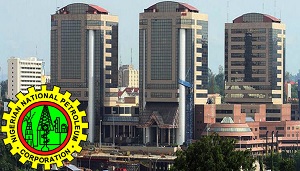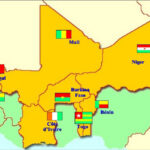Muhammadu Buhari, President of the Federal State of Nigeria announced on Tuesday, July 19, 2022, the denationalization of the public oil company, Nigerian National Petroleum Corporation (NNPC). Thus, the company will now be a commercial enterprise in its own right and the central State will no longer have to intervene.
In accordance with Nigeria’s Petroleum Industry Act, which aims to revive this sector of importance to the economy, the Nigerian State has denationalized the Nigerian National Petroleum Corporation (NNPC), the national corporation. Henceforth, the State withdraws from the affairs of the company where it will no longer have to intervene as a decision-maker, as is the case for all other private companies or enterprises. This means that the NNPC will operate without government interference or funding. Nigeria, the largest oil producer in Africa, has great potential but has recently been struggling to take full advantage of it because of the poor management that prevails in this sector. Minister of State for Petroleum Resources Timipre Sylva explained that Nigeria had lost about $50 billion in new foreign investment before the adoption of the new oil law. The country’s current production capacity is estimated at 1.4 million barrels of oil per day, low compared to the Organization of Petroleum Exporting Countries (OPEC) quota of 1.8 million. Driven by corruption, inefficiency, high production costs and security concerns, the country has received little investment in recent years. But created since 1977, the NNPC is one of the barons of production. It is the largest asset holder in the Nigerian oil and gas industry. In addition to exploration activities, the company is active in refining, petrochemicals, product transportation and marketing. NNPC is three refineries in Port Harcourt, Warri and Kaduna, and strategic business units focused on exploration and production, gas development, distribution, engineering and commercial investment. In other words, it has solid experience and will be able to participate in the recovery of the sector to improve its participation in the Nigerian economy and GDP. Because revenues from the oil sector account for the bulk of foreign exchange resources and about half of the state budget. That is why, « We are transforming our oil industry in order to strengthen its capacity and commercial relevance for current and future global energy priorities, » even justified Muhammadu Buhari, President of Nigeria who added: « the creation of an independent and trade-oriented national oil company, which will operate without relying on state funding, will attract more foreign investment. »
Semi-darkness for the smuggling circuit
It is no secret that Nigerian oil has made several fortunate people in neighbouring countries such as Benin and Cameroon. Benin shares 780 kilometres of the border with Nigeria. In a study carried out by David Zounmènou and published on the website of the Institute of Security (ISS Today) in May 2021, « illegal fuel trade covers 80% of national demand. The smugglers buy fuel in Nigeria and bring it into Benin on motorcycles, using clandestine roads, » we read. Thousands of barrels flow to these countries via the winding smuggling corridor. Hundreds of citizens of those countries were engaged in the trafficking of petrol from Nigeria to those two countries, where they were compensating for the inability of service stations, which were still insufficient to meet all the demand. Better still, because of the thinness and porosity of the borders, several Beninese will be sourcing petroleum products from Nigeria and reselling them in Cotonou, in the departments of Ouémé and Plateau, which border Nigeria. While the litre of petrol is sold to more than 500 FCFA in service stations, in Benin 600 F diesel, at the entrance to Nigeria, particularly Owodé, Beninese people are coming from Cotonou, Porto-Novo and elsewhere and will be supplied with 290 or 300 FCFA. A cheap market that drains the world especially on Friday evenings and Saturdays mornings. A little closer to the borders, Ifangni, in the Plateau, Porto-Novo in Ouemé, we have the liter between 350 and 400 FCFA. Profitable costs, a « cheap » that will soon take a hit due to the denationalization measure. With this withdrawal of the State from the market, the cessation of subsidies, the burden would fall more heavily on the private operator, the NNPC. Already in Nigeria, despite the fact that the state will remain to regulate the market, a slight increase in sales prices is already expected. On the basis of the reorganisation announced by the Nigerian President, Muhammadu Buhari, security and traffic control would be constantly strengthened, with difficulties for smugglers. In return, profitable countries such as Benin and Cameroon in particular will experience a reduction in their supply due to access difficulties. The consequence, one can be convinced, will be the auctioning also of contraband gasoline and the long queues in the service stations already in insufficient number to meet expectations.
Early anticipation in Benin, profits in sight
If States such as Benin have repeatedly undertaken in vain to struggle with this market because of its high share and its networks, this denationalization could offer new opportunities. In addition, the failure of the fight was often linked to the inability of the service stations to contain demand. But increasingly, they cover the territory better, especially in cities, and we could hope to see them better satisfy the market. However, the tension between Russia and Ukraine, which has repercussions on the entire international market for several products, including oil, will not make it any sooner easy for the country to take control of the situation. It will also be more difficult for people who have been used to fuel at lower cost for several decades. But this provision will undoubtedly make good business for the State. The reduction in the scope for smuggling, the decline that this measure will bring in Nigeria in the « black market for black gold », will lead to an improvement in the turnover of service stations and therefore in taxes or the state treasury. This decision could finally strengthen economic cooperation between the two States that last year signed an agreement to create a free trade area with respect for each other’s rights.



